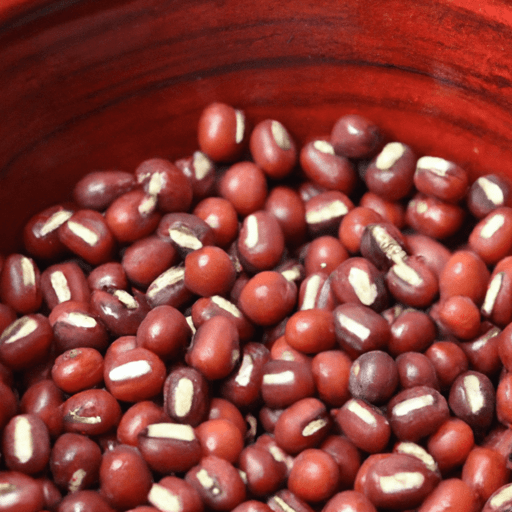Aduki Beans: The Tiny Beans Packed with Flavor and Nutrition
When it comes to versatile and nutrient-rich legumes, aduki beans take the spotlight. These small but mighty beans are a staple in many cuisines around the world. Known for their earthy flavor and a slightly sweet undertone, aduki beans bring a delightful twist to various dishes. From savory stews to delectable desserts, their culinary possibilities are endless.
Taste and Texture
Aduki beans, also commonly known as azuki beans, boast a delicate and creamy texture that holds up well during the cooking process. When cooked, they retain their shape, making them an excellent choice for salads, soups, and stir-fry recipes. The flavor profile of aduki beans is distinctive, with a nutty taste and a hint of natural sweetness. This unique combination makes them a popular choice to balance both savory and sweet dishes.
Common Uses in Cooking
These humble legumes have found their place in numerous culinary traditions worldwide. In East Asian cuisine, aduki beans are a key ingredient in classic dishes like red bean paste for mochi and sweet soups. In Japan, they are celebrated during the New Year as a symbol of good luck and prosperity. Aduki beans are also popular in India, where they are used in dal, curries, and even sweetened desserts like kheer.
In Western cuisine, aduki beans are often used to add depth and texture to various dishes. They can be stewed with vegetables and spices to create hearty vegan chili or transformed into mouthwatering veggie burgers. Their versatility extends to desserts as well, with aduki bean brownies and cookies gaining popularity among health-conscious individuals.
Nutritional Value
Aduki beans are not only a flavor-packed addition to your meals but also a nutritional powerhouse. They are an excellent source of plant-based protein, making them an ideal choice for vegetarians and vegans. These beans are rich in dietary fiber, which aids digestion and promotes a healthy gut. Aduki beans are also low in fat and contain essential vitamins and minerals like iron, magnesium, and potassium.
Moreover, aduki beans are known to have antioxidant properties and may contribute to overall health and well-being. Including them in your regular diet can help boost energy levels, support heart health, and promote balanced blood sugar levels.
Interesting History and Facts
Aduki beans have a fascinating history dating back thousands of years. They are believed to have originated in East Asia, specifically China and Korea, where they have been cultivated for over 3,000 years. These beans hold cultural significance and are associated with longevity and good fortune in various Asian traditions.
In addition to their cultural importance, aduki beans have also found their place in traditional medicine systems, such as Ayurveda. They are believed to have a warming effect on the body and are often used to support kidney and bladder health.
Conclusion
Aduki beans are a versatile and nutritious addition to any kitchen. With their unique taste, firm texture, and numerous health benefits, these tiny beans are a delightful ingredient to explore. Whether you’re looking to incorporate them into your savory dishes or experiment with sweet treats, aduki beans are sure to elevate your culinary creations. So go ahead and embrace the flavors and history surrounding aduki beans, and let your creativity thrive in the kitchen.
Origin:
- Aduki beans, also known as adzuki or azuki beans, are native to East Asia, primarily China and Japan.
- They have been cultivated in these regions for over 2,000 years and are an important part of traditional Asian cuisine.
Common Uses:
- Aduki beans are commonly used in both sweet and savory dishes in various Asian cuisines.
- In Japan, they are often sweetened and used as a filling for traditional pastries like mochi and dorayaki.
- In China and Korea, aduki beans are used to make a variety of sweetened bean pastes that are used in desserts and as fillings for buns and dumplings.
- They can also be cooked and used in savory dishes such as soups, stews, and rice dishes.
Nutritional Benefits:
- Aduki beans are a good source of protein, dietary fiber, and complex carbohydrates.
- They are also a good source of minerals such as iron, magnesium, potassium, and zinc.
- Aduki beans are naturally low in fat and contain no cholesterol.
- They are rich in antioxidants, which can help protect the body against inflammation and oxidative stress.
Unique Properties and Historical Significance:
- Aduki beans are small and have a reddish-brown color with a slightly sweet and nutty flavor.
- In traditional Chinese medicine, aduki beans are believed to have properties that can help strengthen the kidneys and promote healthy circulation.
- Aduki beans are often used during festive occasions, such as the Japanese New Year, where they symbolize good luck, prosperity, and the flushing out of the old year’s bad luck.
- In Japan, an ancient tradition called “Oshiruko” involves eating sweet aduki bean soup during the winter to warm the body and provide energy.
Remember, while aduki beans can be a nutritious addition to a balanced diet, it’s always important to consider individual dietary needs and consult with a healthcare professional or registered dietitian.




Use the share button below if you liked it.
It makes me smile, when I see it.